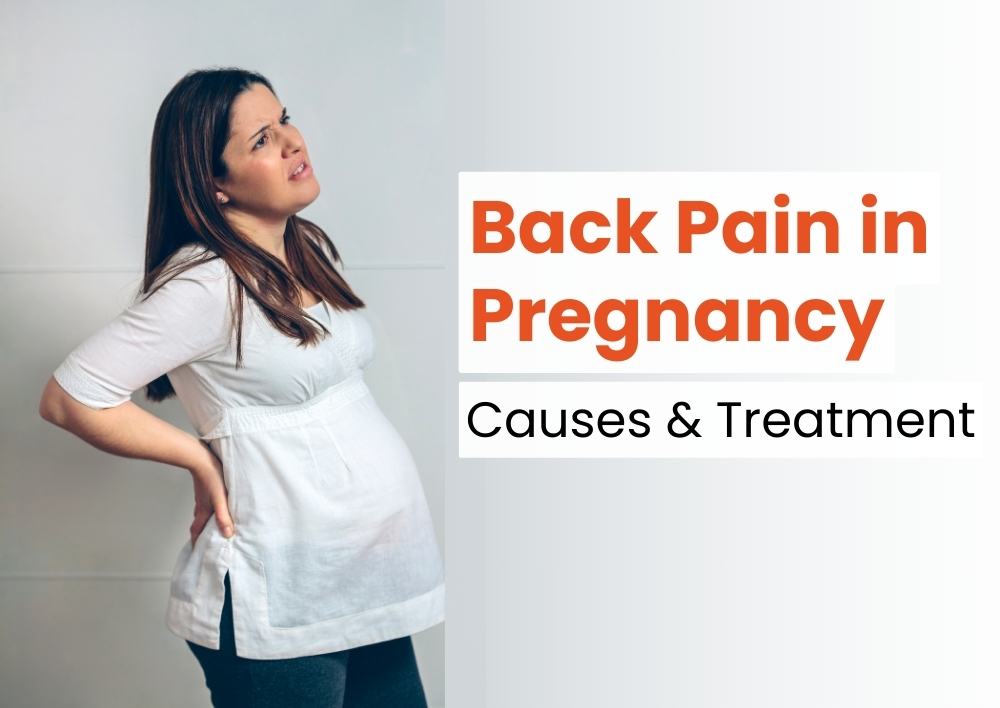Back Pain in Pregnancy: Causes & Treatment
Pregnancy is a beautiful journey filled with the glow of excitement and the anticipation of new life. But let’s be real, it also comes with its fair share of discomforts that can crash your joyful ride. One of the biggest culprits? Back pain! As your baby bump grows, your body undergoes incredible changes that can leave your back aching and sore. But don’t worry, understanding the causes of back pain in pregnancy, finding relief, and taking preventive measures can make all the difference.
If you're struggling with back discomfort during pregnancy, this blog post is your go-to guide. The top gynaecologist in Gurgaon at Miracles Apollo Cradle reveals the secrets behind backache during pregnancy and shares expert tips to manage it. Don’t let this common woe overshadow your pregnancy glow. Read on for a deep dive into relief and prevention!
What is Back Pain in Pregnancy?
Back pain is a common and often uncomfortable symptom experienced by many pregnant women. It can occur at any stage of pregnancy, although it is more prevalent during the later trimesters. Knowing the causes and effective management strategies can help relieve discomfort and promote a healthier pregnancy experience.
Causes of Back Pain in Pregnancy
Back pain during pregnancy is a common complaint, and it can result from a variety of causes. Here are some of the primary reasons for back pain related to pregnancy:
-
Weight Gain: During a healthy pregnancy, women typically gain between 25 and 35 pounds. The spine has to support this weight, which can cause lower back pain. The weight of the growing baby and uterus also puts pressure on the blood vessels and nerves in the back as well as the pelvis area.
-
Posture Changes: Pregnancy shifts the center of gravity. To adapt to this shift, women often change their posture and the way they move, which can lead to back pain or strain.
-
Hormonal Changes: During pregnancy, the body produces the hormone relaxin, which allows ligaments in the pelvic area to relax and joints to become looser in preparation for the birthing process. This hormone can cause ligaments supporting the spine to loosen, leading to instability and pain.
-
Muscle Separation: As the uterus expands, two parallel sheets of muscles can separate along the center seam, a condition called diastasis recti. This separation can worsen back pain.
-
Stress: Emotional stress can cause muscle tension in the back, which may be felt as back pain or spasms.
-
Changes in Lifestyle and Activity Levels: Pregnancy usually leads to changes in activity levels. Reduced physical activity or adopting a more sedentary lifestyle can also contribute to muscle weakness and back pain.
-
Poor Posture and Body Mechanics: Poor posture and body mechanics, such as bending from the waist instead of the knees, can strain the back muscles. Lifting heavy objects improperly or sitting for extended periods can also worsen back pain.
Tips for Managing Back Pain During Pregnancy
Managing back pain during pregnancy involves a combination of self-care strategies and professional support. Here are some effective remedies for back pain during pregnancy to help relieve and manage back pain:
-
Exercise Regularly: Engage in low-impact activities such as walking, swimming, or prenatal yoga to strengthen the muscles that support your back and improve overall flexibility.
-
Practice Good Posture: Stand up straight and tall, hold your chest high, keep your shoulders back and relaxed, and avoid locking your knees. Use a supportive chair while sitting and place a small pillow behind your lower back if needed.
-
Lift Properly: While lifting objects, squat down and lift with your legs instead of bending at the waist to avoid straining your back.
-
Use Supportive Shoes: Wear low-heeled, supportive shoes with good arch support. Avoid high heels and flat shoes that do not provide proper support.
-
Sleep Comfortably: Sleep on your side with a pillow between your knees to take pressure off your lower back. Use a pregnancy pillow to provide additional support.
-
Apply Heat and Cold: Use a heating pad or warm towel on your back to soothe aching muscles. A cold pack can also help reduce inflammation and numb pregnancy-related back pain.
-
Get a Prenatal Massage: A professional prenatal massage can help relieve muscle tension and improve circulation. However, you need to ensure the massage therapist is well-trained in prenatal techniques.
-
Use a Maternity Support Belt: Wearing a support belt can help relieve the strain on your lower back by distributing the weight of your growing belly more evenly.
-
Maintain a Healthy Weight: Gaining weight within the recommended range can help minimize the additional stress on your back.
-
Try Physiotherapy: A physiotherapist can teach you exercises and stretches specifically designed to strengthen your back and abdominal muscles.
-
Practice Stress-Reduction Techniques: Engage in activities that help reduce stress, such as deep breathing exercises, meditation, or gentle stretching.
-
Stay Hydrated: Drink plenty of water to keep your body hydrated and to help maintain the elasticity of your tissues.
-
Avoid Prolonged Standing or Sitting: Take frequent breaks to move around and change positions. If you must stand for long periods, rest one foot on a low stool to reduce back strain.
-
Consult a Gynecologist: If your back pain is severe or constant, consult your gynecologist. They can recommend safe pain relief options and other interventions.
By incorporating these tips into your daily routine, you can help manage back pain during pregnancy and improve your overall comfort and well-being.
When to Consult Doctor
While back pain is common during pregnancy, certain symptoms may indicate a more serious problem. Contact your gynecologist if you experience:
-
Severe or sudden pain
-
Pain that lasts more than two weeks
-
Pain accompanied by vaginal bleeding, fever, or burning while urinating
-
Numbness or weakness in the legs
Conclusion:
Having pain in the back during pregnancy is a very common but manageable issue. By understanding the causes, practicing good posture, staying active, and using supportive techniques, you can alleviate discomfort and enjoy your pregnancy journey more fully. If your pain persists or worsens, consult with the best gynaecologist near you at Miracles Healthcare to ensure the well-being of both you and your baby.















Was the information useful?
0 0